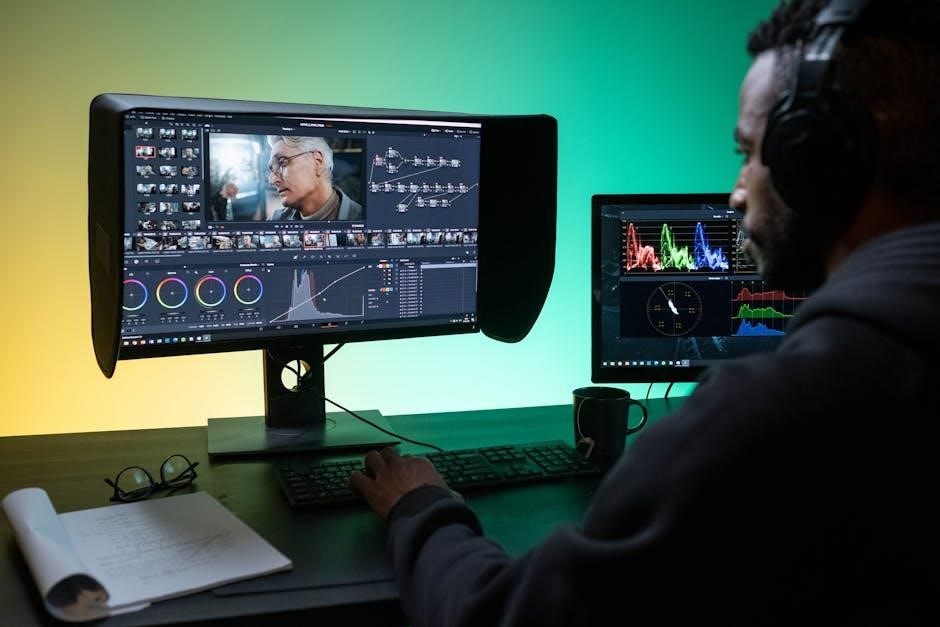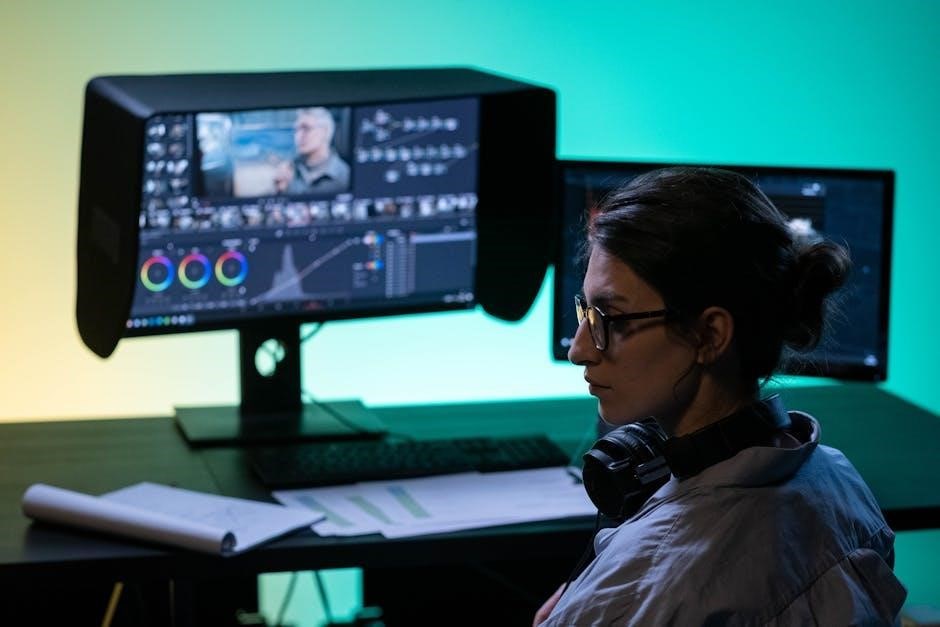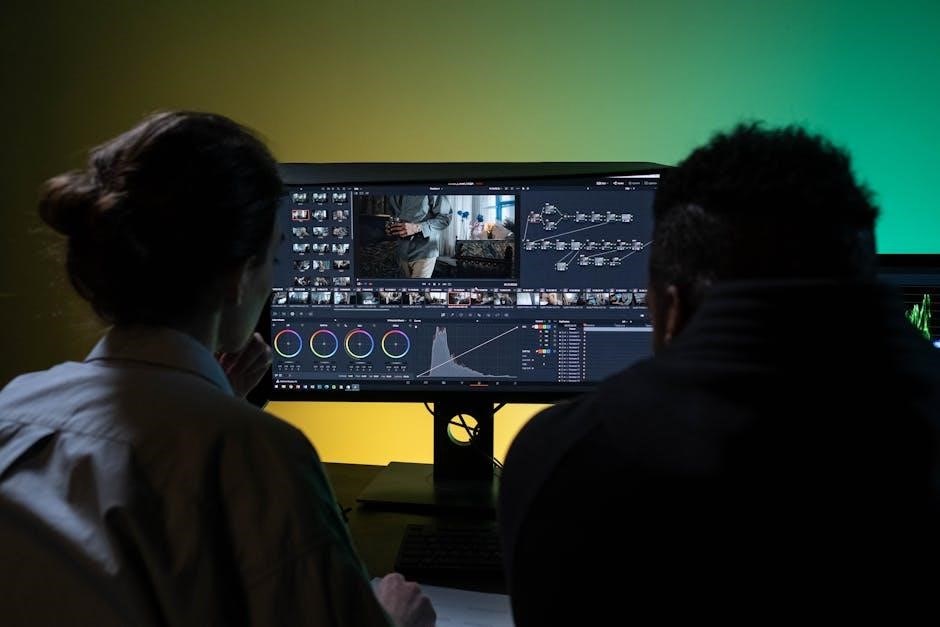mass media law 22nd edition pdf free

Overview of Mass Media Law
Mass media law governs the rights and responsibilities of media outlets‚ balancing freedom of expression with intellectual property and ethical standards. It addresses copyright‚ fair use‚ and ethical practices‚ ensuring legal compliance while promoting responsible communication.
Mass media law encompasses legal principles governing the creation‚ distribution‚ and regulation of content across various media platforms. It addresses issues like copyright‚ defamation‚ and ethical standards‚ ensuring media outlets operate responsibly. The law balances freedom of expression with the need to protect intellectual property and maintain public trust. As digital platforms evolve‚ mass media law adapts to new challenges‚ such as digital rights management and online privacy. Understanding these laws is crucial for media professionals to navigate legal complexities and avoid infringement. This section provides a foundational overview of key concepts and their implications in the modern media landscape.
Key Concepts and Principles
Mass media law revolves around core principles such as copyright protection‚ fair use‚ and the public domain. Copyright ensures creators’ exclusive rights over their work‚ while fair use allows limited use without permission for purposes like education or commentary. Defamation laws protect individuals from false statements that harm their reputation. Ethical practices‚ such as accuracy and transparency‚ are essential to maintain public trust. These principles guide media professionals in navigating legal and moral dilemmas‚ ensuring content is lawful and responsible. Understanding these concepts is vital for avoiding infringement and upholding the integrity of media communication in both traditional and digital platforms.

Copyright Law and Fair Use
Copyright law protects original works‚ granting creators exclusive rights. Fair use permits limited use without permission for education‚ commentary‚ or news‚ balancing creativity and intellectual property rights.
Understanding Copyright Basics
Copyright law grants exclusive rights to creators to reproduce‚ distribute‚ and display their original works. It protects literary‚ musical‚ and artistic works‚ ensuring creators control their intellectual property. Fair use allows limited use without permission for education‚ commentary‚ or news. Public domain works are no longer under copyright and can be freely used. Determining what is in the public domain can be complex‚ but as of January 1‚ 2020‚ works published before 1923 are generally included. Seeking permission is crucial to avoid infringement‚ and understanding these principles is key to navigating copyright legally and ethically in media and academia.
Exceptions to Copyright: Fair Use and Public Domain
Exceptions to copyright include fair use and public domain works‚ which allow limited use of copyrighted material without permission. Fair use permits reproduction for purposes like education‚ commentary‚ or news‚ but its application depends on factors such as the purpose‚ nature‚ and amount of the work used. Public domain works are no longer protected by copyright and can be freely used. Works published before 1923 are generally in the public domain as of January 1‚ 2020. Understanding these exceptions is crucial for avoiding infringement and ensuring legal use of copyrighted material in academic and media contexts. They balance intellectual property rights with public access to knowledge and creativity.

Accessing Academic Resources Legally
Accessing academic resources legally involves using public domain materials or seeking permission for copyrighted works. Avoid illegal PDFs and always request permission when necessary to ensure compliance.
Where to Find Free and Legal Academic Resources
Free and legal academic resources can be found through public domain works‚ open-access journals‚ and educational repositories. Platforms like Google Scholar‚ JSTOR‚ and ResearchGate offer access to scholarly articles. University libraries often provide subscriptions to academic databases. Additionally‚ websites like Project Gutenberg and ManyBooks host free e-books. For media law resources‚ check open-access journals or institutional repositories. Always verify the legality of the source and respect copyright laws. Using public domain materials or works under Creative Commons licenses is a safe option. Contacting authors or publishers for permission is another ethical way to access copyrighted material legally.
How to Request Permission for Copyrighted Material

To request permission for using copyrighted material‚ identify the copyright owner and contact them directly. Use formal templates or letters to outline your intended use. Provide details about the material‚ purpose‚ and scope of use. Respectfully await their response and negotiate terms if needed. If denied‚ explore alternative resources or seek fair use exceptions. Always prioritize legal compliance to avoid infringement. Permissions ensure ethical use of intellectual property‚ fostering respect for creators’ rights while enabling access to valuable content.

The Importance of Ethical Media Practices
Ethical media practices ensure responsible communication‚ fostering trust and integrity. They respect intellectual property rights‚ promote legal compliance‚ and maintain high standards in content creation and dissemination.
Ethical Considerations in Media Law

Ethical considerations in media law are crucial for upholding integrity and fairness. They involve respecting intellectual property rights‚ avoiding plagiarism‚ and ensuring fair use of copyrighted material. Media professionals must seek permission for using others’ work or eliminate such content to prevent legal risks. Ethical practices also encompass accurate reporting‚ transparency‚ and accountability. By adhering to these principles‚ media outlets maintain public trust and contribute to a balanced information ecosystem. These ethical standards are essential in the digital age‚ where content dissemination is rapid and widespread. Legal compliance and moral responsibility go hand in hand in shaping responsible media practices.

Consequences of Copyright Infringement
Copyright infringement can lead to severe legal consequences‚ including lawsuits‚ fines‚ and injunctions. Violators may face financial penalties and damage to their reputation. Legal actions can be costly and time-consuming‚ emphasizing the importance of adhering to copyright laws. Additionally‚ digital platforms may remove infringing content‚ impacting its reach and visibility. Ethical media practices are essential to avoid such repercussions. Always seek permission or eliminate the use of copyrighted material to mitigate risks. Understanding fair use and public domain rules is crucial for compliance. Ignorance of copyright laws is not a valid defense‚ making it imperative to ensure all content is legally sourced or properly licensed.

Digital Rights and Media Distribution
Digital rights management (DRM) protects media content from unauthorized use‚ while platforms like streaming services redefine distribution. This balance between protection and accessibility shapes modern media law.
Digital Rights Management (DRM)
Digital Rights Management (DRM) refers to technologies and strategies used to protect digital content from unauthorized use‚ ensuring copyright protection. It involves encryption‚ watermarks‚ and licensing agreements to control access and distribution. DRM is widely used in media platforms like streaming services and e-books to prevent piracy and ensure fair compensation for creators. While DRM safeguards intellectual property‚ it sometimes sparks debates over user freedom and fair use. Understanding DRM is crucial in the digital age‚ as it shapes how media is consumed and distributed legally. By balancing protection and accessibility‚ DRM plays a pivotal role in maintaining the integrity of digital content in evolving media landscapes.
The Impact of Digital Platforms on Media Law
Digital platforms have revolutionized media law by introducing new challenges and opportunities. Social media‚ streaming services‚ and online publishing have expanded content distribution‚ raising issues like copyright infringement‚ privacy‚ and content moderation. These platforms must navigate laws protecting intellectual property while balancing free expression. Digital platforms also influence public perception and consumption of media‚ often blurring the lines between traditional and digital content. As technology evolves‚ media law must adapt to address emerging issues‚ ensuring fair use and ethical practices. The rise of digital platforms has created a dynamic legal landscape‚ requiring continuous updates to regulations and practices to keep pace with innovation.

Emerging Issues in Media Law

Emerging issues in media law include digital platform regulation‚ privacy concerns‚ and intellectual property challenges‚ requiring updated legal frameworks to address evolving technological and societal changes.
New Challenges in the Digital Age
The digital age presents new challenges in media law‚ including issues like copyright infringement‚ digital piracy‚ and the ethical use of social media. As content becomes more accessible online‚ questions arise about fair use and public domain boundaries. Additionally‚ the rise of digital platforms has led to concerns over privacy‚ data protection‚ and the spread of misinformation. Ethical considerations‚ such as the responsibility of platforms to moderate content‚ further complicate the legal landscape. These challenges require updated legal frameworks to address evolving technological advancements and societal expectations. Balancing intellectual property rights with freedom of expression remains a critical focus in adapting media law to the digital era.
FUTURE DIRECTIONS IN MEDIA LAW
Future Directions in Media Law
Future directions in media law will focus on adapting legal frameworks to technological advancements and global connectivity. Digital rights management‚ AI regulation‚ and data protection will become central themes. As media evolves‚ laws must address issues like deepfakes‚ privacy breaches‚ and misinformation. International cooperation will be crucial to standardize regulations across borders. Ethical considerations‚ such as algorithmic bias and content moderation‚ will require new guidelines. The rise of virtual reality and augmented reality will introduce novel legal challenges. Additionally‚ streamlined licensing systems and clearer fair use definitions will be essential. Balancing innovation with legal protections will shape the future of media law‚ ensuring it remains relevant in a rapidly changing world.



Leave a Reply
You must be logged in to post a comment.